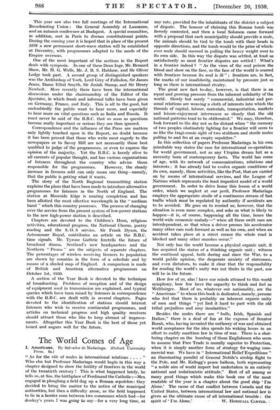The World Comes of Age
0 As for the role of mules in international relations . . . . " Who else but Professor Madariaga would begin in this way a chapter designed to show the futility of frontiers in the world of the twentieth century ! This is what happened lately, he tells us, at Sos, the birthplace of Ferdinand the Catholic :—Men engaged in ploughing a field dug up a Roman sepulchre: they decided to bring the matter to the notice of the municipal authorities, but then a difficulty arose, as the field happened to lie in a border zone between two communes which had—for donkey's years I was going to say—for a very long time, at any rate, provided for the inhabitants of the district a subject of dispute. The honour of claiming this Roman tomb was fiercely contested, and then a local- Solomon came forward with a proposal that each municipality should provide a mule, the animals should be tied to the tomb with their heads in opposite directions, and the tomb would be the prize of which- ever mule should succeed in pulling the heavy weight over to its own side. In this way the dispute was settled, at least as satisfactorily as most frontier disputes are settled What's in a frontier indeed ? " As the vices of the soul poison the blood and show on the face, so the face of the world is scarred with frontiers because its soul is ill " : frontiers are, in fact, the marks of our insolidarity, maintained by pressure just so long as- there is international rivalry.
The great new fact to-day, however, is that there is an equal and growing pressure from the inherent solidarity of the world. Slowly but surely " commercial, industrial and per- sonal relations are weaving a cloth of interests into which the threads of capital, labour, materials, transportation, markets and leisure-enjoyment interweave so closely that the old national patterns tend to be obliterated." We may, therefore, look forward to the day not so far distant when " the memory of two peoples obstinately fighting for a frontier will seem to us like the tragi-comic sight of two stubborn and sterile mules pulling to and fro at an empty sepulchre."
In this collection of papers Professor Madariaga in his own inimitable way states the case for international co-operation, for world government, not as any Utopian dream but as a necessity born of contemporary facts. The world has come of age, with its network of communications, relations and interests ; it has already had to evolve organic conditions of its own, namely, those activities, like the Post, that are carried on by means of international services, and the League of Nations which represents the least imperfect model of a world government. In order to drive home this lesson of a world order, which we neglect at our peril, Professor Madariaga employs the appropriate simile of a continuous stream of fast traffic which must be regulated by authority if accidents are to be avoided. He goes on to remind us, however, that the situation is even more complex, and asks us what is likely to happen—it is, of course, happening all the time, hence the world-wide economic malady—" when all these swift cars are interdependent, so that when a driver presses his accelerator many other cars rush forward as well as his own, and when an accident takes place at a street corner the whole road is blocked and many other smashes occur."
Not only has the world become a physical organic unit, it has acquired the status of a thinking organic unit ; witness the continual appeal, both during and since the War, to a world public opinion, the desperate anxiety of statesmen, and even dictators, to make it clear that the responsibility for rending the world's unity was not theirs in the past, nor will be in the future.
How few of us, alas ! have our minds attuned to this world symphony, bow few have the capacity to think and feel as Weltbiirger. Most of us, whatever our nationality, are the " Americans " to whom this book is dedicated, namely, persons who feel that there is probably an inherent organic unity of men and things " yet 'find it hard to part with the old tribal prejudices and cosy insularities."
Besides the mules there are " bulls, Irish, Spanish and Italian," there is a deal of fun at the expense of Senatoi Borah, who, having invented the outlawry of war and obtained world acceptance for the idea spends his waking hours in an effort to codify maritime law in time of war. There is a shat- tering chapter on the humbug of those Englishmen who seem to assume that Free Trade is morally superior to Protection, when it is simply another form of strategy for waging 'com- mercial war. We have in " International Relief Expeditions " an illuminating parallel of General Nobile's airship flight to the Pole, and Mr. Kellogg's peace balloon, both representing " a noble aim of world import but undertaken in an entirely national and isolationistic attitude." Best of all among so many good things- which make this book one of the most
readable of the year is a chapter about the good ship `I'm
Alone.' The cause of that conflict between Canada and the United States, between international law and national law is given as the ultimate cause of all international trouble : the
spirit of ` I'm Alone.' •• ' • • W. HORE4FALL CARTER.






































 Previous page
Previous page